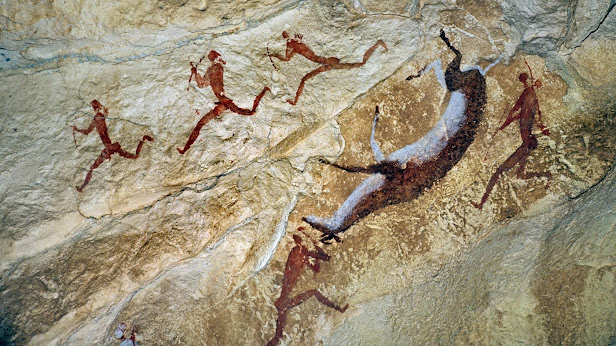STUDENTS : ''' '' HISTORY
!WOW! HIGHEST '' '''
THE DAWN OF EVERYTHING : '' WE ARE ALL PROJECTS of collective self-creation,'' they write. ''What if, instead of telling the story about how our society fell from some idyllic state of equality -
We ask how we came to be trapped in such tight conceptual shackles that we can no longer imagine the possibility of reinventing ourselves?''
"The Dawn of Everything'' sees pervasive evidence for large complex societies that thrived without the existence of the state, and defines freedom chief as ''freedom to disobey.''
But if the book helps convince people, in the words of the Occupy slogan, that 'another world is possible,'' that's not unintentional.
ONE AUGUST NIGHT in 2020, David Graeber - the anthropologist and anarchist activist who became famous as an early organizer of Occupy Wall Street - took to Twitter to make a modest announcement.
''My brain feels bruised with nub surprise,'' he wrote, riffing on a Doors lyric. ''It's finished?''
He was referring to the book he'd been working on for nearly a decade with the archaeologist David Wengrow, which took as its immodest goal nothing less than upending everything we think we know about the origins and evolution of human societies.
Even before the Occupy movement made him so well known, Graeber had been hailed as one of the most brilliant minds in his field.
But his most ambitious book also turned out to be his last. A month after his Twitter announcement, Graber, 59, died suddenly of necrotizing pancreatitis, prompting a shocked outpouring of tributes from scholars, activists and friends around the world.
''The Dawn of Everything : A New History of Humanity,'' out on Nov.9 in the United States from Farrar Straus and Groux, may or may not dislodge the standard narrative popularized in mega-sellers like Yuval Noah Harari's ''Sapiens'' and Jared Diamond's ''Guns, Germs and Steel.''
But it has gathered a string of superlative-studded [if not entirely uncritical] reviews. Three weeks before publication, after the book suddenly shot to No.2 on Amazon, the publisher ordered another 75,000 copies on top of the 50,000 first printing.
In a video interview in September, Wengrow, a professor at University College London, slipped into a mock-grandiose tone to recite one of Graeber's favorite catchphrases : '' We are going change the course of human history - starting with the past.''
More seriously, Weingrow said, ''The Dawn of Everything'' - which weighs in at a whopping 704 pages, including a 63-page bibliography - aims to synthesize new archeological discoveries of recent decades that haven't made it out of specialist journals and into the public consciousness.
''There's a whole new picture of the human past and human possibility that seems to be coming into view,'' he said. ''And it really doesn't resemble in the slightest these very entrenched stories going around and around.''
The Big History best-sellers by Harari, Diamond and others have their differences. But they rest, Graeber and Wengrow argue, on a similar narrative of linear progress [or, depending on your point of view, decline].
According to the story, for the first 300,000 years or so after Homo sapiens appeared, pretty much nothing happened. People everywhere lived in small, egalitarian hunter-gatherer groups, until the sudden invention of agriculture around 9000 B.C. gave rise to sedentary societies and states based on inequality, hierarchy and bureaucracy.
But all of this, Graeber and Wengrow argue, is wrong. Recent archaeological discoveries, they write, show that early humans, far from being automatons blindly moving in evolutionary lock step in response to material pressures, self consciously experimented with ''a carnival parade of political forms.''
It's a more accurate story, they argue, but also ''a more hopeful and more interesting'' one.
''We are all projects of collective self-creation,'' they write. ''What if, instead of telling the story about how our society fell from some idyllic state of equality, we ask how we came to be trapped in such a tight conceptual shackles that we can longer even imagine the possibility of reinventing ourselves?''
'' We've reached the stage of history where we have scientists and activists agreeing our prevailing system is putting us and our planet on a course of real catastrophe,'' Wengrow said.
''To find yourself paralyzed, with your horizon closed off by false perspectives on human possibilities, based on a mythological conception of history, is not a great place to be.''
The Honor and Serving of the Latest Global Operational Research on History, Past, Present, Future and Writings, continues. The World Students Society thanks review author Jennifer Schuessler.
With respectful dedication to the Leaders, Grandparents, Parents, Students, Professors and Teachers of the world. See Ya all prepare and register for Great Global Elections on The World Students Society - for every subject in the world : wssciw.blogspot.com and Twitter - !E-WOW! - The Ecosystem 2011 :
Good Night and God Bless

.png)


0 comments:
Post a Comment
Grace A Comment!